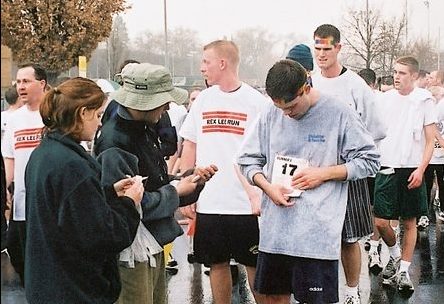Brothers In Law
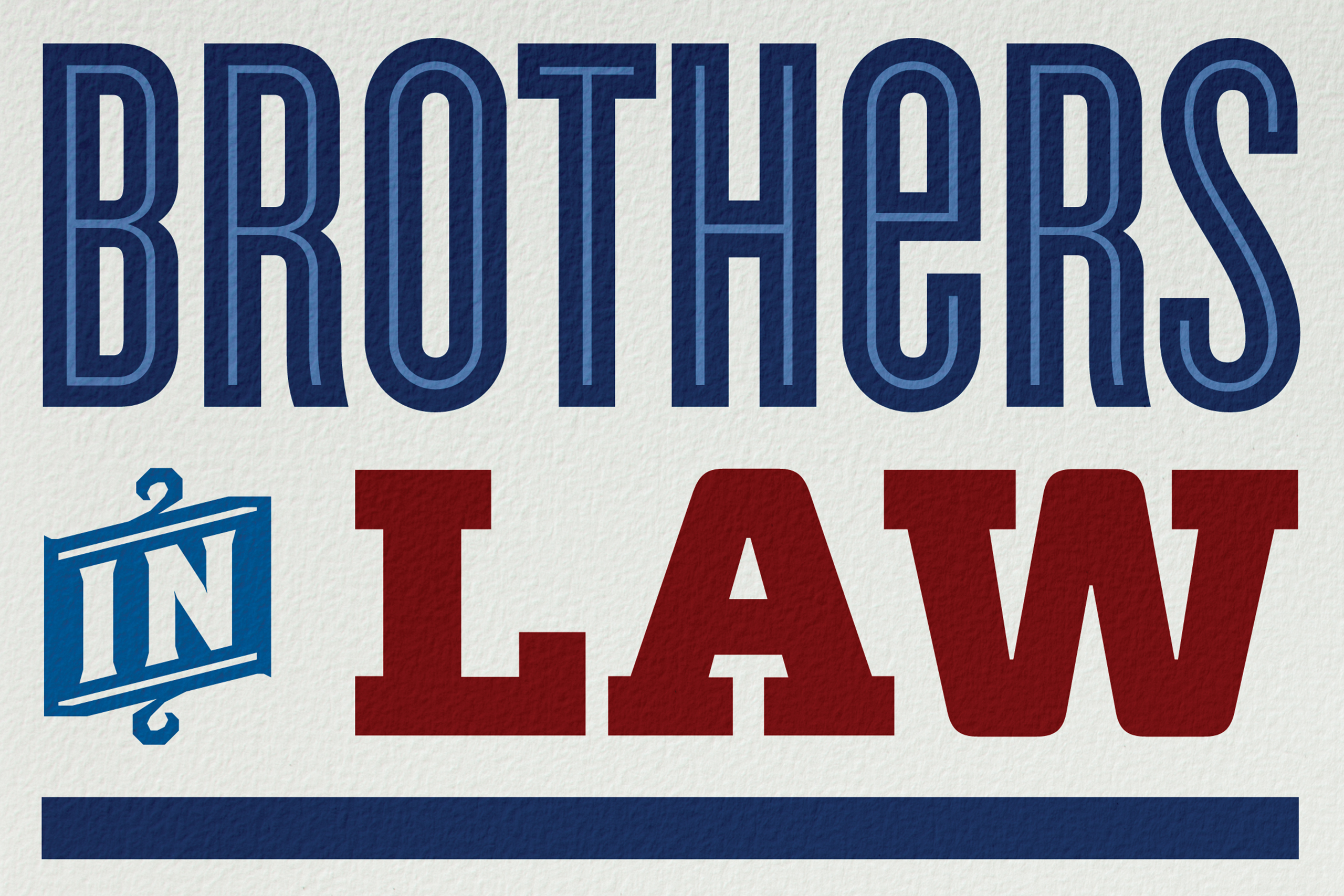
In the U.S. Senate and the Utah Supreme Court, Mike and Tom Lee carry on the legal legacy of their father, former BYU president Rex Lee.
By Peter B. Gardner (BA ’98) in the Spring 2011 Issue
Rex E. Lee (BA ’60) stands at a lectern, facing the row of black-robed, solemn-faced jurists. Citing statute, precedent, and Constitutional limits, his voice reverberates across the courtroom, interrupted occasionally by questions from his audience of nine.
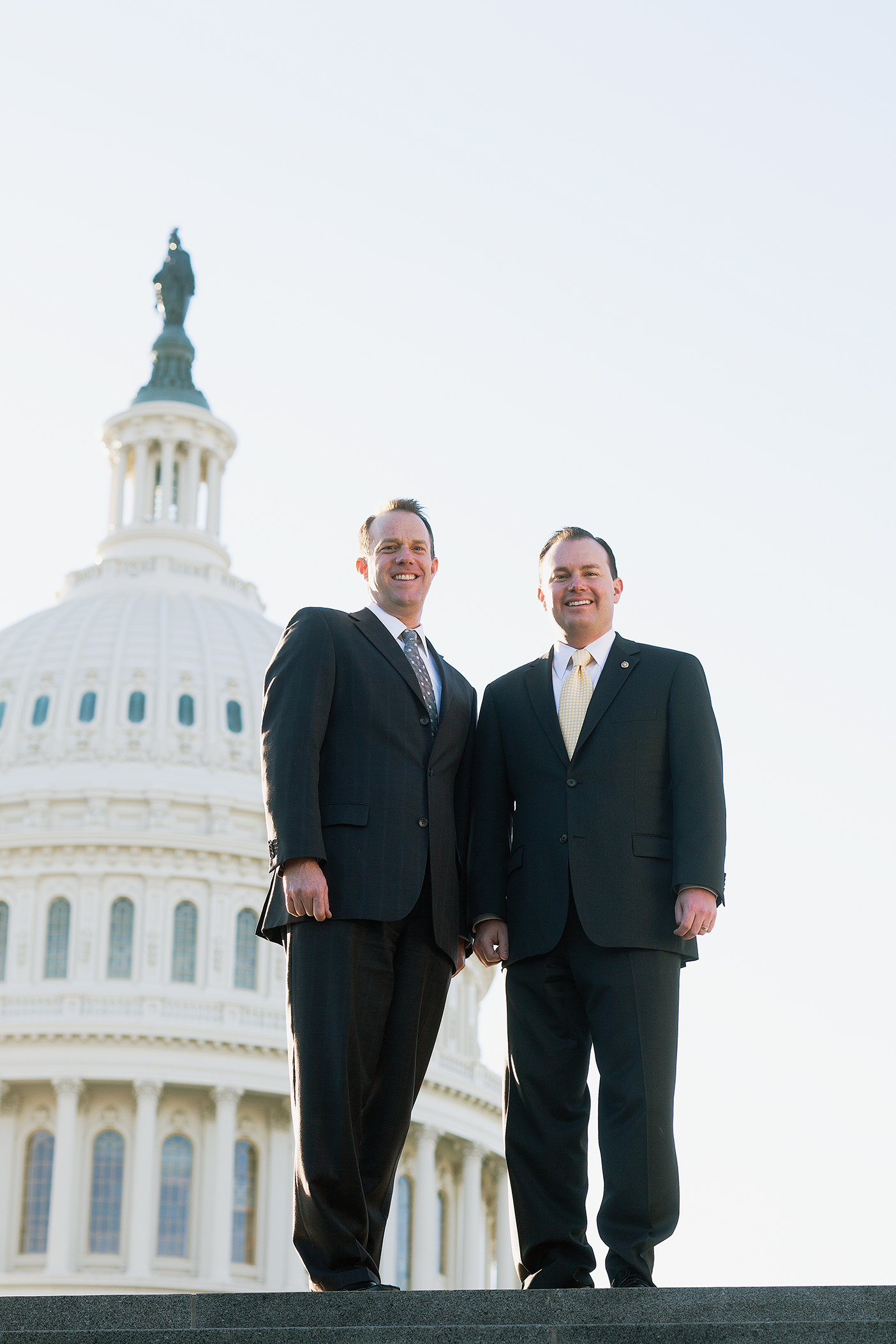
Behind him, across the bar that separates participants and spectators, sits 10-year-old Mike Lee on a wooden pew beside his mother, his brother, and a sister. They’ve come in Sunday best to hear their father and husband argue a case before the U.S. Supreme Court. Mike strains to understand the meaning of the words, but his thoughts and gaze soon detach from his father and drift upward, to a frieze high on the wall.
There, two figures—sage, august, muscular—sit on thrones from which they contemplate the conflict between good and evil, depicted on a frieze on the opposite wall. Mike’s not sure what they signify, but something in their stony persistence, their dignified, proud posture, transfixes him and fills him with awe.
Over three decades, Michael S. Lee (BA ’94) and his brother, Thomas R. Lee (BA ’88), would return again and again to that courtroom—as children of the solicitor general, as clerks to Supreme Court justices, and once as attorneys pleading a case together. And though the surroundings have become familiar, the brothers have never gotten over the impact of that place or what the enthroned figures represent—the “Majesty of Law” and the “Power of Government.” Sons of a former BYU president, Mike and Tom have both assumed their own lofty offices in the last year, respectively, as a U.S. senator and a Utah Supreme Court justice. Through it all they remain bound together—and to their late father—by their reverence for law, government, and the Constitution.
Liberty, Legality, Fraternity
Sandwiched between an older and a younger sister, 6-year-old Tom Lee spent months praying for just one thing—a brother. “My faith would have been absolutely crushed if he had not been a boy,” he says. In a family that ended up with just two boys among seven children, Tom was more than grateful for an ally and a sidekick.
Calling Mike an “old soul from birth,” Tom says he’s looked up to Mike from the time his brother was about 4. Their mother, Janet Lee Chamberlain (BS ’60), says Tom’s admiration was more than matched by Mike’s, who dutifully performed whatever Tom asked of him. She remembers an 8-year-old Mike happily trekking “many, many blocks” to buy a soda for his brother—just because Tom asked.
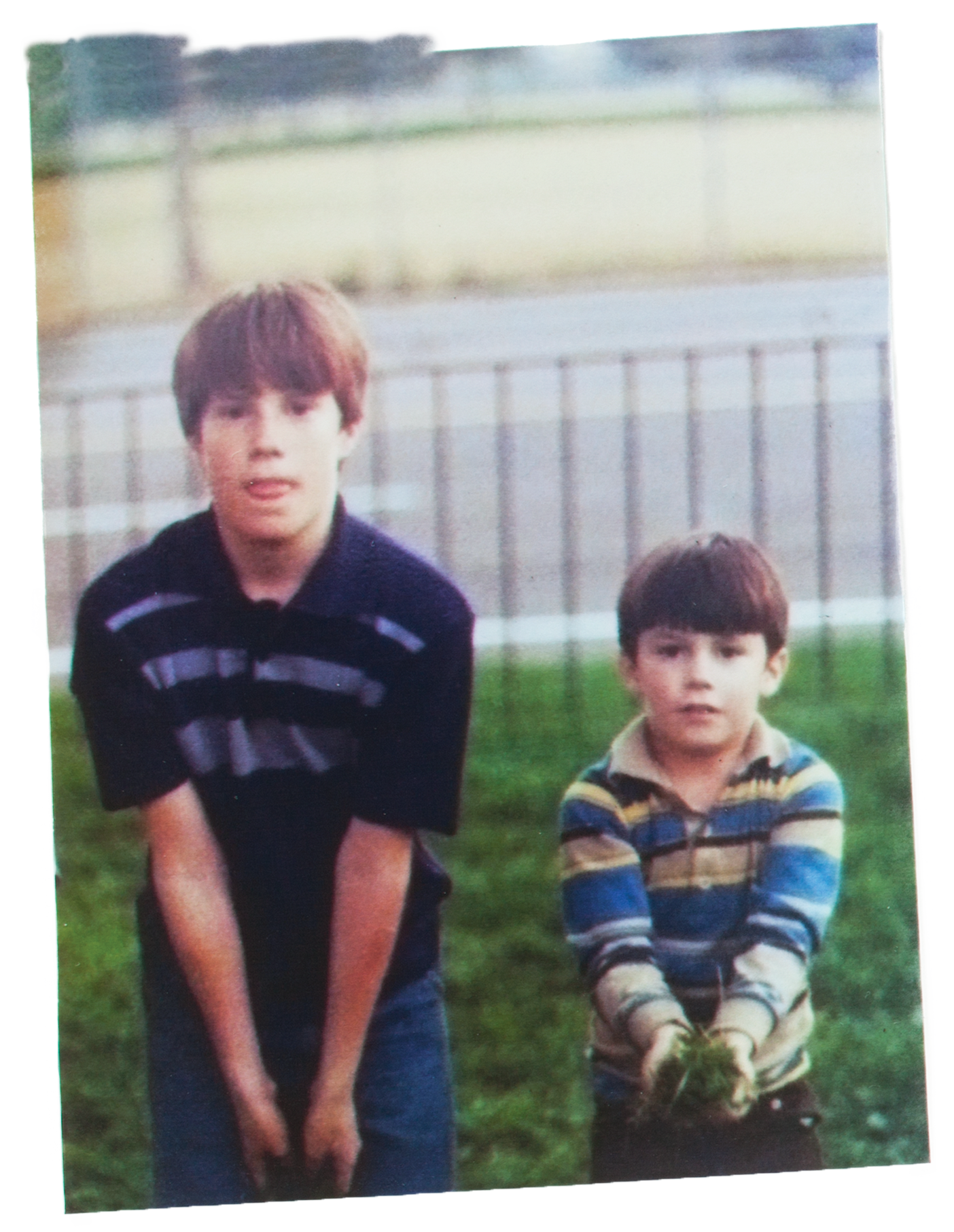

Mutual admiration didn’t prevent occasional practical jokes by Tom. (Mike concedes that Tom, as older brother, had a “constitutional obligation to tease.”) From regular kidding to a scoop of Vaseline in his sister’s hair, the future judge developed a reputation for youthful hijinks. But Janet points out what always followed—a heartfelt apology and efforts to repair any damages, including buying a new baby doll for his sister to replace the casualty of a backyard hanging. Inevitably, says Janet, Tom “will always come back and say, ‘I‘m sorry. I was wrong.’”
Tom’s penchant for pranks notwithstanding, Mike calls him an ideal older brother, “my role model and mentor the entire time I was growing up.” Sister Wendy Lee Jacobson (BA ’89) says, in the areas that mattered, Tom and Mike were totally trustworthy. “If they told me something, no matter what they said, I knew it was the truth.”
Though Janet says Tom tended to be tunnel focused in a few interests and Mike was interested in everything, the boys shared an enthusiasm for things legal. “I don’t know if we Lee boys are genetically capable of doing anything else,” laughs Tom, noting that their paternal grandfather, who died before Rex was born, was also an attorney. But nurture certainly played its part.
When Rex Lee left his job as the founding dean of BYU’s J. Reuben Clark Law School to serve for a year as an assistant U.S. attorney general in the mid 1970s—and later when he spent four years in the early 1980s as solicitor general—the Lees transplanted their young family to northern Virginia, where they lived among families of politicians, diplomats, bureaucrats, and attorneys. Senator Harry Reid’s family was in their ward, and Reid was their home teacher.
When Rex became solicitor general, Janet would occasionally pull her kids out of school to see him argue before the Supreme Court. Even though the intricacies of the cases were over their heads, Mike and Tom found the process fascinating. And Mike got a kick out of observing his father’s mood swings. Before and during the arguments, Rex devoted all his faculties into crafting a persuasive case. But back in his office following the argument, that pent up energy would explode into utter euphoria. Mike likens it to a kid on a sugar high. “When he came out of there, he was just really excited to talk about it.”
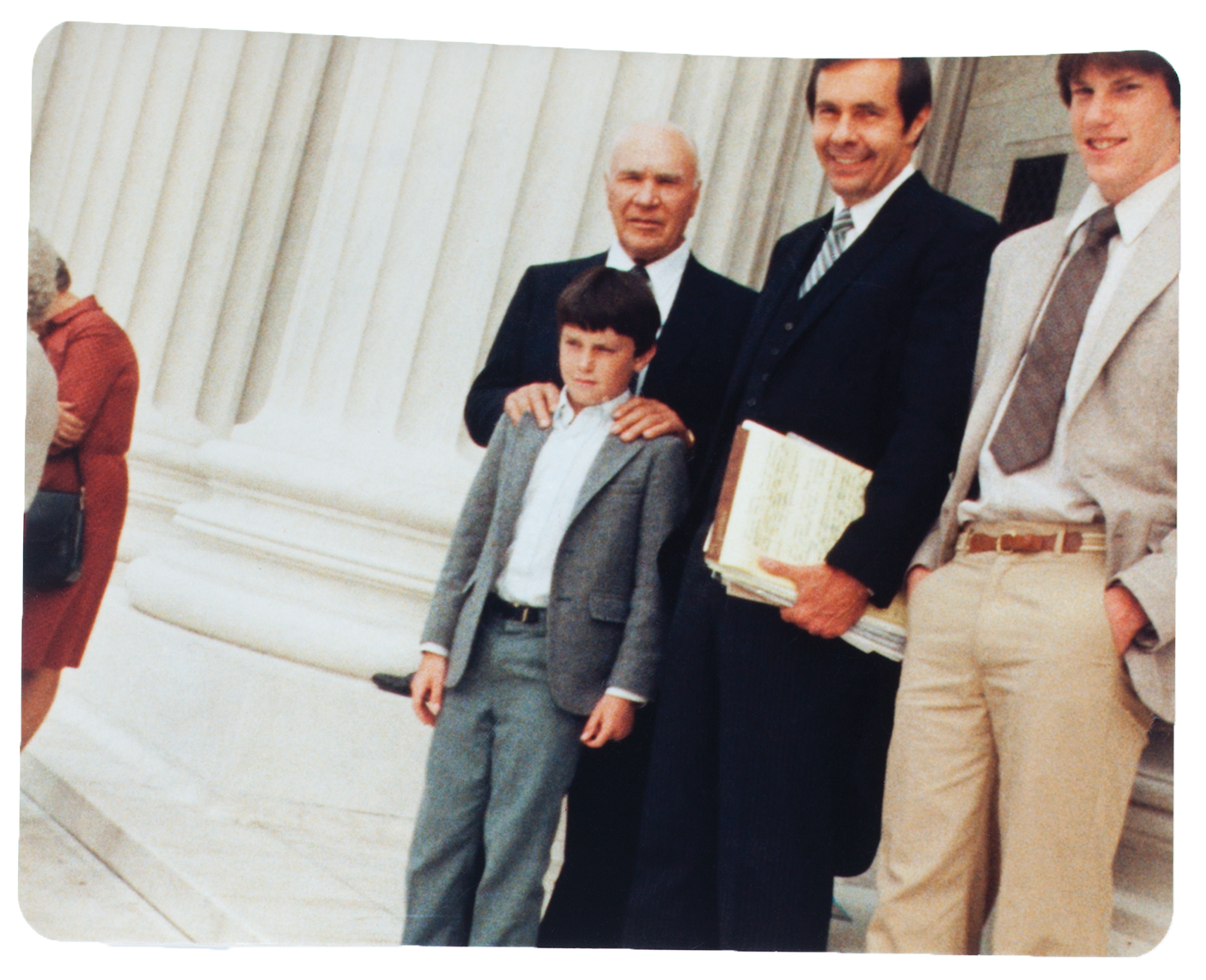
Rex’s zeal for law and the Constitution naturally spilled into family time, and conversations with his children about checks and balances, dissenting opinions, and the political issues of the day were the norm around the dinner table. “He . . . had a real capacity for explaining complex concepts in simple terms,” says Tom. It was a reflection of Rex’s belief that the best appellate lawyers can reduce complex legal arguments into terms even children can understand.
Although all their children engaged in the conversations, Janet says Rex’s spark took hold in their boys’ intellectual tinder. She remembers them asking “very in-depth, interesting questions from a very early age.”
This growing interest in the law tightened the bond between father and sons, especially later, as Tom and Mike began their formal legal studies. Tom’s wife, Kimberly Johnson Lee (BA ’93), remembers the threesome’s lively discussions on arcane details of the law. “To talk about . . . complicated issues and have somebody really get it was a really bonding thing for them,” she says.
As they formed their own families, Tom and Mike began to pass on the patterns of their childhood to another generation. Janet remembers the hilarity of Mike as a law student practicing his oratory skills on his infant twin boys in their baby seats. Sharon Burr Lee (BA ’94), Mike’s wife, says he inherited his dad’s knack for making the complicated understandable to their sons and daughter. “I’ve watched my children become very interested in [legal] cases—even as 5-year-olds,” she says. And Tom has made it a point to carry on the tradition of discussing his work and the Constitution with his two girls and four boys.
Rex’s death from cancer in 1996 drew the brothers even closer as Tom took on more of a paternal role in the family and the two looked to each other for professional and fraternal support.
“They have a very high mutual respect for each other,” says Kim. “[Tom] has said to me several times, ‘I’m so glad I have a brother.’”
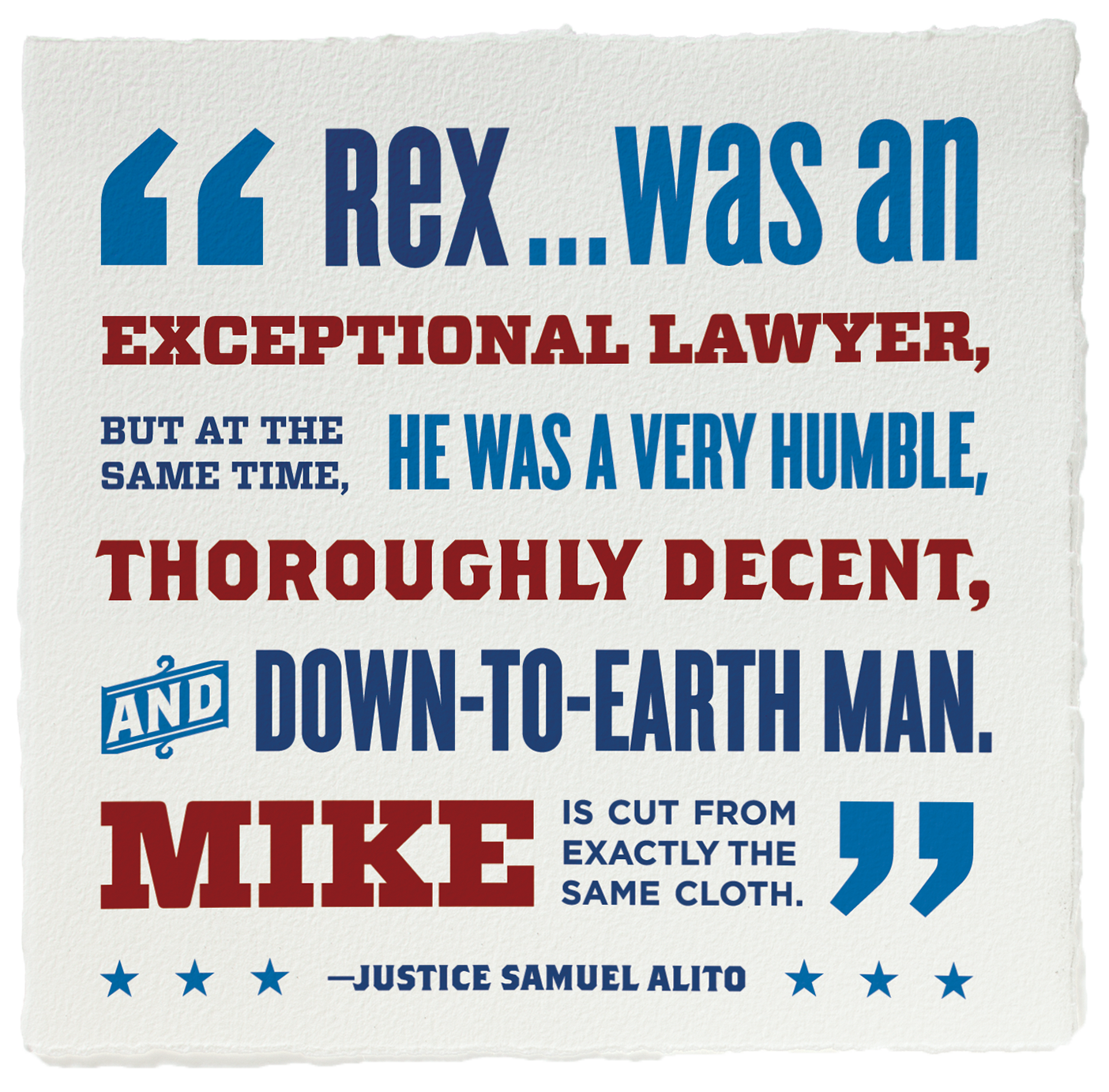
Like Father, Like Sons
Line up the résumés of Rex, Tom, and Mike Lee, and the similarities are impossible to ignore. Rex graduated from BYU (as did Tom and Mike), where he was student body president (Mike was BYUSA president). He went on to graduate first in his class at the University of Chicago Law School (where Tom graduated with high honors 28 years later). He then clerked for Supreme Court justice Byron White (Tom clerked for Justice Clarence Thomas; Mike for Justice Samuel Alito). Rex worked for a time as an assistant attorney general in the U.S. Department of Justice (where Tom was a deputy assistant attorney general and Mike an assistant U.S. attorney). After his years as solicitor general, he joined the firm Sidley and Austin, through which he continued to argue Supreme Court cases (Mike argued appellate cases for Sidley and Austin). Off and on during his career he taught at BYU’s law school (where Tom taught full-time for 13 years), before being named BYU president in 1989.
Supreme Court justice Samuel Alito, who worked for Rex Lee as an assistant solicitor general, couldn’t help noticing Mike’s “uncanny resemblance to his father” in legal ability and personality. “Rex . . . was an exceptional lawyer, but at the same time, he was a very humble, thoroughly decent, and down-to-earth man. Mike is cut from exactly the same cloth.”
But Supreme Court justice Clarence Thomas, for whom Tom clerked in the mid-1990s, says not to take resemblances too far. While Rex was certainly an example, he says there was neither coattail hanging nor coasting in his wake. “It’s earned, let me tell you,” says Thomas. “[Tom] admires his father greatly, but everything he has gotten is because of his performance.”
If Mike and Tom felt any pressure to pursue law, they say it didn’t come from their father, who was anything but pushy. “I think that was a great favor he did for me,” says Tom, “in making sure, if I was going to head down a career path similar to his, that it was my own decision.”
And with the expectations and pressures that naturally result from being the solicitor general’s son, Tom nearly decided law wasn’t for him. Kim remembers Tom, then a BYU undergrad, cramming for the LSAT, stressed to the point of physical illness. After seriously considering other options, he decided to take the LSAT anyway—receiving high enough marks to be accepted into top programs. “He doubts himself a lot,” says Kim. “Maybe that’s why he tries so hard.”
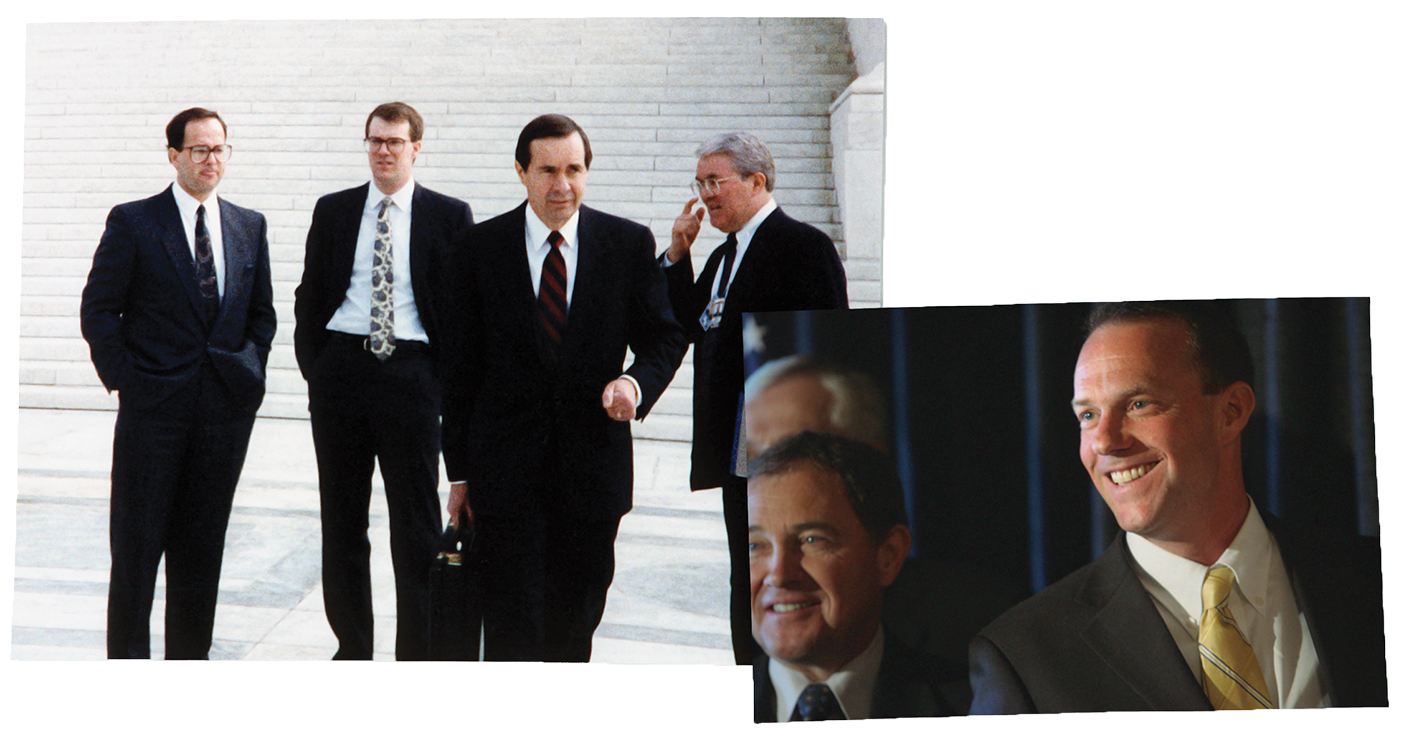
His worrying ways followed him to the University of Chicago Law School, where his father was a famous alum. Tom never advertised what his middle initial (R., for Rex) stood for, to avoid comparisons. “He didn’t want that pressure,” says Kim. But worry again led to extra effort, and Tom excelled.
Tom’s love for law flourished in law school and during his two clerkships—first for Judge J. Harvie Wilkinson III of the U.S. Court of Appeals for the Fourth Circuit, then for Thomas—where he was able to study all sides of cases and “see behind the curtain.” And secretly he hoped to someday land a similar position. “I didn’t admit that to very many people, because it sounds presumptuous,” he says. “But I remember probably a month into my clerkship with Judge Wilkinson . . . thinking, ‘My boss has the best job in the world.’”
Mike’s studies at BYU’s Law School and three clerkships were equally impactful. After clerking for U.S. District Court judge Dee V. Benson (BA ’73), he clerked twice for Alito—first in the U.S. Court of Appeals for the Third Circuit and later at the Supreme Court. A self-described “law geek,” Mike remembers his giddiness during his final clerkship as he’d leave for work each morning. “I’d tell Sharon, ‘I’m going to work now . . . at my job at the Supreme Court of the United States . . . where I work.’”
The brothers both landed in law practices, and Tom joined BYU’s Law School faculty in 1997, where he focused on trademark and licensing law and continues as an adjunct professor today. Along with his appreciation for BYU’s unique mission and teaching environment, Tom admits that a major draw was BYU sporting events, which he began attending with his father as a child. Calling himself “certifiably nuts as a Cougar fan,” he says few things come ahead of BYU sports on his priority list.
In his legal work, Mike dealt mostly with appellate law in the 10th Circuit. As often as circumstances allowed, he found opportunities to work on cases with Tom, “probably the best lawyer I’ve ever worked with,” Mike says. For his part, Tom says, “Every chance I got I involved Mike in what I was doing, because I found that when I did, inevitably the work product was substantially better.”
Most notably, the duo represented Utah in challenging the results of the 2000 census, contending that a faulty population count had denied Utah a seat in the U.S. House of Representatives. The case took them back to the Supreme Court, where Tom literally stood in his father’s footsteps at the lectern. “I had been in that courtroom many times,” he says, “but . . . it feels nothing like walking into that courtroom when you know you’re going to be on the hot seat. It was simultaneously the most rewarding and fulfilling experience and absolutely the most intimidating experience of my legal career.”
Though Rex Lee died in 1996, his influence on his sons continues. Tom occasionally consults briefs from cases Rex argued, which are bound in dozens of volumes in Tom’s office. Mike has downloaded audio files to listen to his dad’s arguments while commuting or in his office, “just sort of as background music.” And, while researching past cases, he’s often happened upon his father’s name in the documents.
Mike says crossing paths with his father of 15 years ago is both startling and gratifying. This intertwining of lives, he says, has “made the study and practice of law far more interesting.”
![Designed quote by Tom Lee that reads: "[We're] passionate people...who say what we think and care a lot about ideas and issues....Anyone who knows our family could tell you it is a hallmark of the Rex and Janet Lee family."](https://magazine.byu.edu/wp-content/uploads/2011/04/secondquote-DONE.png)
Oral Arguments
There are plenty of attractions at Lee holiday dinners—such as “family lounge singer” Mike sitting at the piano to concoct silly lyrics about family members—but the highlight at the adult table isn’t the food, laughter, or catching up on each other’s lives. Call it spirited debate, vigorous opinion sharing, or lively discussion, but the Lee children’s verbal free-for-all, they insist, isn’t fighting.
“It’s all very good natured,” assures Tom.
“But,” Mike admits, “it’s always very loud.”
The sprawling debates range from politics to childrearing to sports. “It gets louder and louder,” says sister Wendy, “and eventually some of the in-laws will lose interest and leave the room.” The discussions have been known to last for hours as everyone gets their word in.
Tom says debating is simply part of what it means to be a Lee: “[We’re] passionate people . . . who say what we think and care a lot about ideas and issues. . . . Anyone who knows our family could tell you it is a hallmark of the Rex and Janet Lee family.”
Janet says the trait can largely be traced back to her and Rex’s parenting style. “The children were always . . . encouraged to speak their mind,” she says. When a child really wanted something that Rex and Janet weren’t sold on, they’d smile and respond with “Make your case. You’re probably not going to win, but we’ll listen.” After hearing the children’s most persuasive appeals, parental responses ranged from a flat “no” to “You’ve almost got me—but no” to “OK, you’ve won your point.”
With this background, the Lee boys developed a multitude of opinions and the tools to express them. Mike remembers one Saturday morning when he was 10 or 11. His parents were out when a Greyhound bus full of activists rolled up in front of their Virginia home to protest a position Rex had argued. Unfazed by the age disparity, Mike strode out into the front yard and launched into a debate with the crowd.
Strong opinions and a desire to influence have made Mike interested in government and public offices as long as he can remember—and made him an easy target for a practical joke.
When Mike was 8, Wendy broke bad news. Unless your mom puts your name on a special list before you turn 1, you can never run for president of the United States. She added that their mom had registered Tom, making him eligible for the office.
“Did she register me?” Mike asked anxiously.
“Oh no,” Wendy replied. “She was really busy that year and didn’t get around to it.” Mike called his dad, but he was in on the joke.
Tom remembers that ”Mike was completely beside himself—just distraught . . . that he wasn’t able to run for president.”
By the time he had graduated from college, Mike was three for three in elections—from sixth-grade class treasurer to high school student-body vice president to BYUSA president. But he set political ambitions aside while establishing himself as an attorney.
It was in the milieu of late 2008—with national elections underway, an economy in free fall, and trillions of dollars pledged to shore up financial markets—that Mike first seriously considered a run for the U.S. Senate. With signs of an expanding federal government and a ballooning deficit to match, the debater in Mike had a thing or two to say about it.
But he wasn’t sure his ideas, based in principles of Constitutional originalism and the enumerated powers doctrine—“law geek stuff”—would appeal to voters. On a dare, he accepted a friend’s offer in February 2009 to present his potential platform to a few dozen neighbors—not lawyers, just normal folks. “To my great astonishment,” he says, “it resonated.” The meeting led to others throughout the state and his eventual candidacy for the Senate.
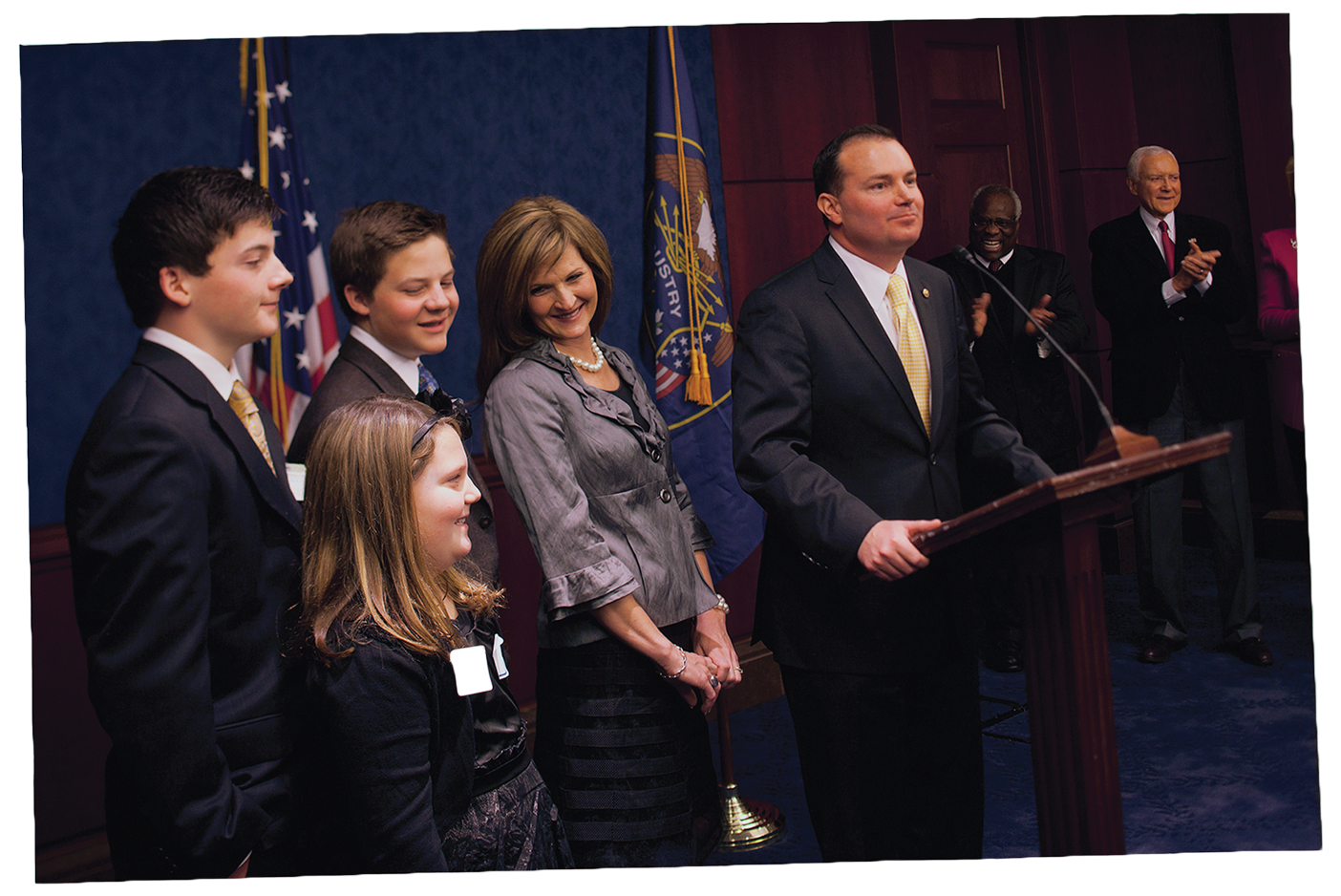
Mike’s big ideas, broadly overlapping with Tea Party initiatives, include dramatic efforts to scale back federal social programs, balance the national budget, and return certain rights to the states. Critics have called him everything from idealistic to delusional. But Mike says he understands the difficulty such changes would entail. “It will be incredibly painful,” he says. And he acknowledges the political will may not exist to accomplish all he hopes to do. But he believes the mounting national debt will make a serious consideration of these issues inevitable by politicians of all persuasions.
In the meantime, he sees it as his role “to restore . . . the Constitutional debate. It has not been happening to the degree it should have for many decades.”
Tom is equally passionate about Constitutional issues, but has never been interested in elected office, a trait his wife says she is “so OK with.” His sister Wendy notes that, where Mike is demonstrative, Tom tends to be “more composed,” at least for a Lee.
As a judge, Tom says he is content to channel his passions into preserving the law rather than implementing change. In fact, he says his interest in the Utah Supreme Court vacancy was largely tied to his concerns about judicial activism, the judiciary’s tendency “to overstep its bounds and to forget its role in our government. . . . Judges are not put into office to make policy to implement the will of the people. They are put into office to interpret the law as it is written and to make sure it is applied in an evenhanded fashion. I’m deeply committed to that role. It’s something I think about every day.”
Though engaged in different endeavors, both Lees are pursuing a similar end—limited government, what Mike calls “the most important principle of the Constitution.” He adds, with classic Lee fervor, “I fundamentally . . . believe and always will believe that Constitutionally limited government is the answer to so many of the problems we face as a nation right now.”
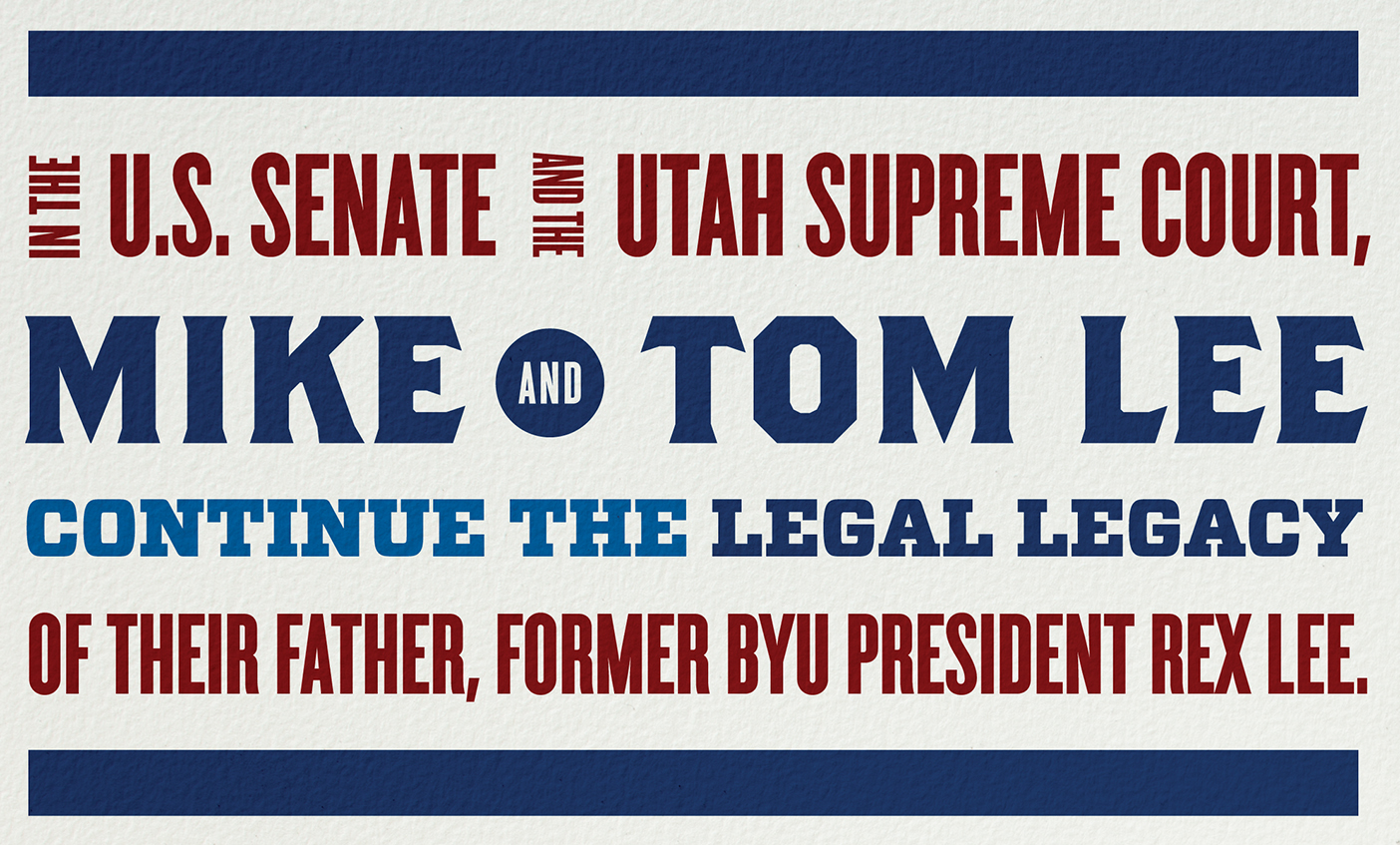
Of Founders and Fathers
Exactly one year from the day he announced his candidacy—almost to the hour—Mike Lee stands before U.S. vice president Joe Biden on the floor of the Senate in the Capitol. Right hand raised, he pledges to “defend the Constitution of the United States of America” as a senator. Tom, sitting with family and Justices Alito and Thomas in the gallery, heartily applauds his brother, at 39 the youngest senator in the 112th Congress and Utah’s first new senator in 18 years. Other friends, family, and staffers cheer from a nearby conference room, where pocket copies of the Constitution are arrayed on each table. Later, after arriving to thank his family and supporters, Senator Lee speaks of his gratitude “to live in a land where the rule of law prevails with a written constitution.”
Nearly six months earlier, at the Utah Supreme Court, it was Tom who raised his hand for an oath of office while surrounded by family, friends, and colleagues. Appointed by Utah governor Gary R. Herbert (’69) to the court and sworn in by mentor Clarence Thomas, Tom pledged to “obey and defend the Constitution of the United States and the Constitution of this state.”
For the Lee brothers, such words carry special meaning and form something of a mandate—to promote the principles the Founding Fathers encoded into the nation’s governing document. But the responsibility they feel to protect the Constitution comes as much from their literal father as from the Founding Fathers. In that sense, it’s a charge they’ve been preparing to fulfill their whole lives.
On Mike’s swearing-in day, Janet reflects on a year of change and achievement for her sons. “Unbelievable,” she says, shaking her head. Yet, while it was incredible to see her boys attain such lofty positions, she says her pride in them has nothing to do with offices or appointments. That, she says, derives from “the kind of people they are, their integrity, and their ability to experience life.”
Feedback: Send comments on this article to magazine@byu.edu.


